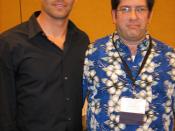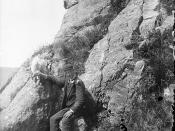The Fall of the House of Usher and The Rocking-Horse Winner
D.H. Lawrence, author of The Rocking-Horse Winner, grew up in a blue collar family only to disregard his past and become a prolific writer. Most of his fiction, specifically The Rocking-Horse Winner, is about characters caught between their unsatisfactory relationships with others and their struggle to break free. Edgar Allen Poe, author of The Fall of the House of Usher, grew up in an aristocratic environment when he was adopted by a merchant at the age of three because his mother had died. Similarly to Lawrence's writing, Poe uses graphic portrayal of imagery to enhance every aspect of the story, from the suspense of the story itself, to the wild personalities of the characters and the similarly morbid themes fundamentally present. Yet the greatest similarity is in the incestuous overtones in their writings.
In The Rocking-Horse Winner, Lawrence portrays the journey of a young man from childhood, to the not-yet-ready state of adulthood in which he attempts to take over the father's role in the family.
Paul, the protagonist of the story, hears of luck and attempts to find out what it is by asking his mother. The only thing that Paul is able to find out from his conversation with his mother is that his father is not lucky and neither is his mother. Already we see that Paul is looking for specialized attention from his mother; he is searching for some kind of satisfaction that only he can obtain from his mother. After the conclusion of this exchange between mother and son, Paul decides that he must be lucky for his mother. Here we see his first order desire which is to be lucky for his mother, but we can glimpse a second...


![[Portrait of Les Paul, Fat Tuesday, New York, N.Y., ca. 1980s] (LOC)](https://s.writework.com/uploads/3/31608/portrait-les-paul-fat-tuesday-new-york-n-y-ca-1980s-loc-thumb.jpg)
Poe and Lawrence
This is well-written and kept my interest. You have chosen excellant quotes to back up your points. I would dispute the last sentence as it doesnt sit well with me to use just two works to make a statement about the huge body of work that is literature. If this is what you can do in two hours, you really must write masterpieces in two days!
2 out of 2 people found this comment useful.